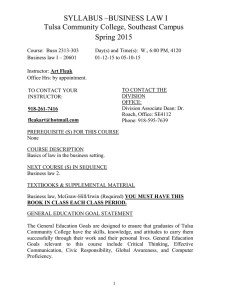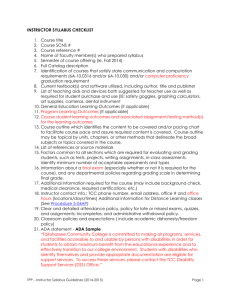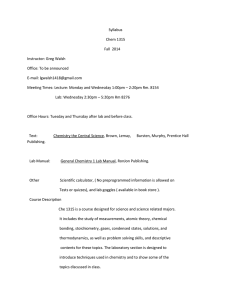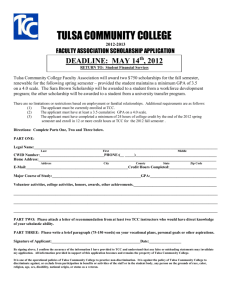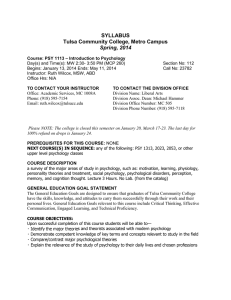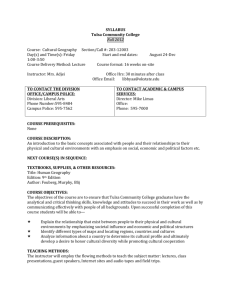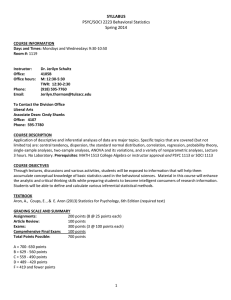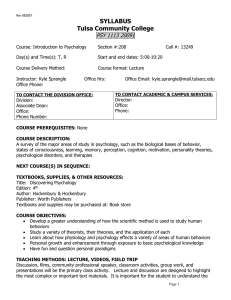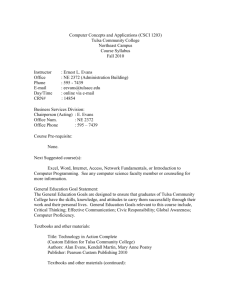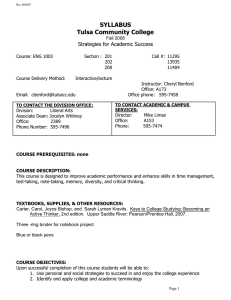new window - Blackboard Learn
advertisement
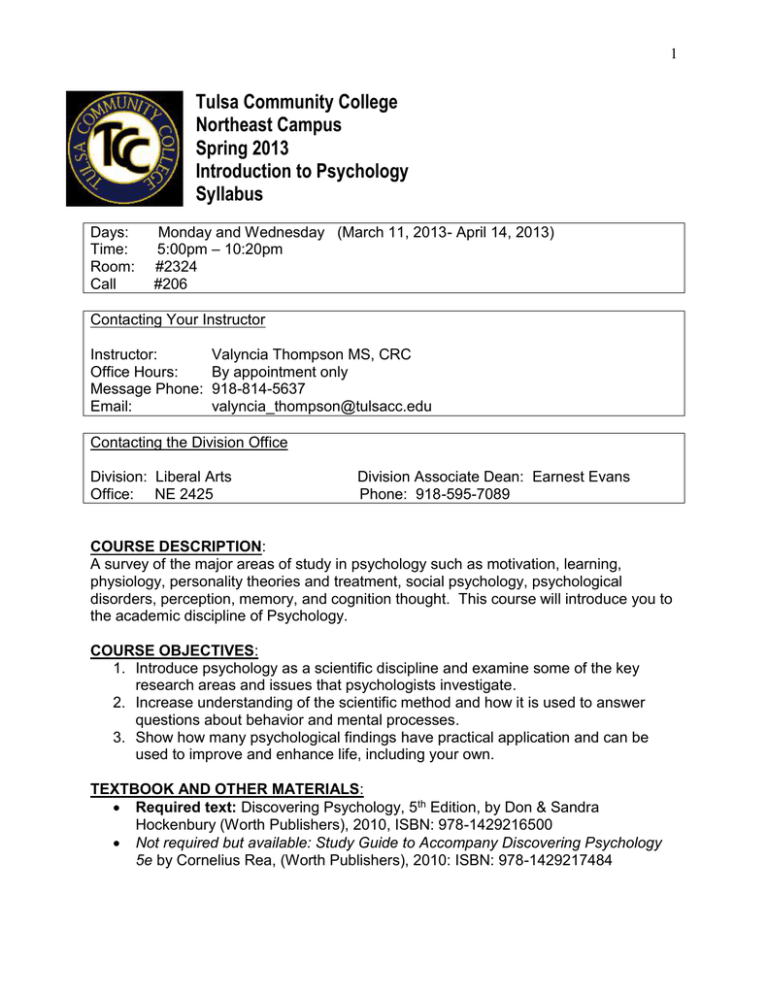
1 Tulsa Community College Northeast Campus Spring 2013 Introduction to Psychology Syllabus Days: Time: Room: Call Monday and Wednesday (March 11, 2013- April 14, 2013) 5:00pm – 10:20pm #2324 #206 Contacting Your Instructor Instructor: Office Hours: Message Phone: Email: Valyncia Thompson MS, CRC By appointment only 918-814-5637 valyncia_thompson@tulsacc.edu Contacting the Division Office Division: Liberal Arts Office: NE 2425 Division Associate Dean: Earnest Evans Phone: 918-595-7089 COURSE DESCRIPTION: A survey of the major areas of study in psychology such as motivation, learning, physiology, personality theories and treatment, social psychology, psychological disorders, perception, memory, and cognition thought. This course will introduce you to the academic discipline of Psychology. COURSE OBJECTIVES: 1. Introduce psychology as a scientific discipline and examine some of the key research areas and issues that psychologists investigate. 2. Increase understanding of the scientific method and how it is used to answer questions about behavior and mental processes. 3. Show how many psychological findings have practical application and can be used to improve and enhance life, including your own. TEXTBOOK AND OTHER MATERIALS: Required text: Discovering Psychology, 5th Edition, by Don & Sandra Hockenbury (Worth Publishers), 2010, ISBN: 978-1429216500 Not required but available: Study Guide to Accompany Discovering Psychology 5e by Cornelius Rea, (Worth Publishers), 2010: ISBN: 978-1429217484 2 CLASSROOM ETIQUETTE: Open and mutually respectful communication of varied opinions, beliefs, and perspectives during classroom or online discussion encourages the free exchange of ideas that is essential to higher learning and to the ability to learn from each other. Students are expected to turn off or place on silent all electronic devices during class. This also includes turning off I-Pods and refraining from texting during class. ATTENDANCE & PARTICIPATION: Since this is 4 week course attendance is very important. It is the responsibility of the student to attend class with appropriate materials and be punctual. The student is encouraged to avoid excessive absences and tardiness. Poor attendance does have an adverse effect on the students’ grade as attendance points are built into the final point calculation. If excessive absences become a problem an excessive absence notice may be initiated. Participation points will be given for class participation in discussions. Please feel free to speak in class during open discussions. LATE ASSIGNMENTS & MAKE UP WORK: Late assignments may be accepted at the beginning of the next class period for a 10% reduction in grade. After that no late assignments will be accepted. MAKE-UP EXAMS Make-up exams will only be given in the case of an excused absence. Make- up exams may differ from the original exam in terms of content and format. If there is no written documentation to support an excused absence, a make-up exam will not be given. However, exams may be taken prior to the exam date, but are only given with instructor approval. SYLLABUS CHANGES: Occasionally, changes to the syllabus may be necessary. Students will be notified of any changes to the syllabus in writing and/or on blackboard. EVALUATION TECHNIQUES: Exams will be drawn from lectures, class discussions, as well as reading assignments. Course work will be measured in terms of quality of content, precise use of the English language & overall participation as a member of the class. ALL assignments done outside of class should be proofread & MUST BE TYPED or they will not be accepted. Grading Scale Final grades will be assigned on the basis of the total number of points accumulated during the semester, using the following scale: Point Total Percentage Letter Grade 600-540 points 100%-90% A 539-480 points 89%-80% B 479-420 points 79%-70% C 419-360 points 69%-60% D Below 359 points 59% or below F 3 Assignments Quizzes – Final Exam – AttendanceGroup Presentation 100 points each (3) 100 points *This will be comprehensive 100 points 100 points *Class (groups) will make presentation on topics in regards to chapter 13& 14. Topics will be given out in class. There will be class time designated in order to adequately prepare for presentation. Presentations will be in PowerPoint format. Each participant of the group will type a one (1) page summary of the ‘group experience’. FORMAT FOR PAPERS: Out of class assignments should be typed. Font size should be no more than 12 (Times New Roman) and one-inch margins should be used. See the instructor if additional help is needed. COURSE WITHDRAWAL The deadline to withdraw from a course shall not exceed 3/4 the duration of any class. Check the TCC Academic Calendar for the deadline that applies to the course(s). Begin the process with a discussion with the faculty member assigned to the course. Contact the Advisement Office at any TCC campus to initiate withdrawal from the course (‘W” grade) or to change from Credit to Audit. Withdrawal and/or change to an audit from a course after the drop/add period can alter the financial aid award for the current and future semesters. Students may receive an outstanding bill from TCC if the recalculation leaves a balance due to TCC. Students who stop participating in the course and fail to withdraw may receive a course grade of “F,” which may have financial aid consequences for the student. COMMUNICATION TCC Alerts: Subscribe to TCC alerts on the TCC Website. You will receive information related to a crisis, emergency, school closings, etc. Email: All communications regarding this course will be sent to students’ MyTCC email accounts; likewise, students should use MyTCC email to send email to the instructor regarding this course. Inclement Weather: If extreme weather conditions or emergency situations arise, information is posted on the TCC website, available through text message alerts, and is provided to local media outlets. GENERAL EDUCATION GOALS 4 General Education courses at TCC ensure that our graduates gain skills, knowledge, and abilities that comprise a common foundation for their higher education and a backdrop for their work and personal lives. TCC’s General Education goals are: Critical Thinking, Effective Communication, Engaged Learning, and Technological Proficiency. DISABILITY RESOURCES It is the policy and practice of Tulsa Community College to create inclusive learning environments. Accommodations for qualifying students in compliance with the Americans with Disabilities Act (ADA) and section 504 of the rehabilitation act are available. To request accommodations, contact the Education Access Center (EAC) at eac@tulsacc.edu or call (918) 595-7115 (voice). Deaf and hard of hearing students may text (918) 809-1864. ACADEMIC DISHONESTY Academic dishonesty (cheating) is defined as the deception of others about one’s own work or about the work of another. Academic dishonesty or misconduct is not condoned or tolerated at campuses within the Tulsa Community College system. Tulsa Community College adopts a policy delegating certain forms of authority for disciplinary action to the faculty. Such disciplinary actions delegated to the faculty include, but are not limited to, the dismissal of disrespectful or disorderly students from classes. In the case of academic dishonesty a faculty member may: Require the student to redo an assignment or test, or require the student to complete a substitute assignment or test; Record a "zero" for the assignment or test in question; Recommend to the student that the student withdraw from the class, or administratively withdraw the student from the class; Record a grade of "F" for the student at the end of the semester. Faculty may request that disciplinary action be taken against a student at the administrative level by submitting such a request to the Dean of Student Services. TOBACCO-FREE ENVIRONMENT Tulsa Community College actively promotes the health and well-being of its students, faculty, staff, and administrators. Numerous Federal studies demonstrate a correlation between tobacco use and health concerns. Therefore, in compliance with Executive Order 2012-01 by the Governor of the State of Oklahoma, Tulsa Community College prohibits the use of any tobacco products on all college-owned, leased, or contracted property, including but not limited to all buildings, land and vehicles owned, leased or contracted for use by Tulsa Community College. The President and Chief Executive Officer of Tulsa Community College or his/her designee is directed to develop, maintain, and facilitate procedures that will provide for the health and safety of its students, faculty, staff, and administrators on all property owned, leased, or contracted by the College as it relates to prohibiting the use of any tobacco products and developing appropriate sanctions. Legal Reference: Oklahoma State Statute, Title 21, Section 1247 5 Oklahoma Governor Executive Order 2012-01 Oklahoma State Statute, Title 63, Section 1-1523 Institutional Statement: Each student is responsible for being aware of the information contained in the TCC Catalog, the TCC Student Policies & Resources Handbook, and semester information listed in the class schedule. All information may be viewed on the TCC website: www.tulsacc.edu 6 Tentative Class Schedule March 11 Review Syllabus Chapter 1- Introduction to Research Methods Chapter 2- Neuroscience and Behavior March 13 Chapter 4- Consciousness and Its Variations Group project information & Take home quiz #1 March 18 & 20 NO CLASS/ SPRING BREAK March 25 Chapter 5Chapter 6- Learning Memory March 27 Chapter 9- Lifespan Development Group project time & Take home quiz # 2 April 1 Chapter 10- Personality Chapter 11- Social Psychology April 3 Chapter 13- Psychological Disorders Chapter 14- Therapies Group project time & Take home quiz #3 April 8 Group presentations / review for final exam April 10 Final Exam

